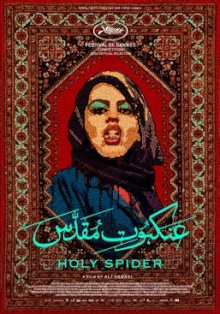We’ve seen Ali Abbasi’s work before in the form of the excellent Border but I had no idea that the director of that Swedish film was even Iranian. Here he has made a film that is set in Iran and inspired by a real-life serial killer active from 2000 to 2001. This looks astonishingly close to an American-style thriller, except it is supposed to be in Iran and that makes all the difference. Even better is that it doesn’t immediately end once the serial killer is caught and as my wife notes, how Iranian society reacts to the ensuing trial is scarier than the murders themselves. This was actually shot in Jordan as this would never have been allowed in Iran itself and so Abbasi holds nothing back in exposing the seedy underbelly of the Islamic Republic.
Following a spate of killings of street prostitutes in the holy city of Mashhad, a journalist Arezoo Rahimi arrives from Tehran to investigate and cover the news. She suspects that the police are complacent as the victims are all corrupt women and even the populace seems sympathetic to the Spider Killer as the media calls him. She collaborates with Sharifi, the editor a local newspaper, who receives telephone calls from the killer after every murder to brag about it and to reveal where he has dumped the corpse. The killer is actually Saeed Hanaei, a married construction worker who fought in the Iran-Iraq War and believes that it is his duty to cleanse the city of prostitutes. When a prostitute that Arezoo speaks to ends up dead and the police officer investigating the case aggressively propositions her in her hotel room, she takes matters in her own hands to pose as a prostitute herself as bait. She does succeed in luring him into targeting her and Sharifi is no help as backup so she barely escapes from being murdered herself. Yet when Saeed is arrested and readily confesses to the 16 murders, it’s only the beginning as he has supporters and allies everywhere who consider him a hero for what he has done.
First off, this film looks amazing and boasts of Western-level production values. I’m a big fan of the works of the other famous Iranian directors but none of them make films that look this slick. Perhaps that is at least partly by design to lend their films a more homegrown feeling but it does make Holy Spider stand out in being effectively a Hollywood-style film that happens to be in Persian. Early on, the film allows a shot of a topless woman and that’s enough to set the tone that this will be a no holds barred film. Indeed, it doesn’t shy away from showing the actual killings in graphic detail yet it is never prurient nor does it feel exploitative. It’s fairly straightforward in showing both Arezoo’s hunt for the killer and how Saeed carries out the murders and hides them from his family. I liked that it keeps the tension high throughout and that the audience feels genuinely fearful for Arezoo. She takes immense personal risks in the pursuit of justice but is never shown to be stupid or silly. On the other hand, Saeed frequently makes mistakes and gets himself injured, but is always given the benefit of the doubt and is protected by the indifference of the authorities and society at large.
This particular story is fictional of course and the character of Arezoo Rahimi was invented by Abbasi. As he notes himself, the purpose is to highlight the misogyny in Iranian society. Every one of Saeed’s victims worked as a street prostitute, enduring untold levels of physical abuse and social ostracism, because it was the only way available to them to support their families. Yet most of the people shown here proclaim that they deserved to die, including their own parents. Arezoo herself is given a hard time beginning from when she checks in by herself into a hotel and every step of the way thereafter. She is fearful of being rape by the investigating police officer and part of her backstory involves being fired from a newspaper due to unwanted advances on the part of the editor. Most telling of all is the character of Fatimah, Saeed’s wife. When a neighbor informs her that Saeed was seen bringing another woman back to their house, she suspects that he has been unfaithful. Her reaction is to seduce her husband to make sure that he still loves her. When it is revealed that he has actually been murdering women, her relief is palpable. She becomes his greatest champion and the family is unbothered at all by the fact that Saeed has been using their home to kill people in. The misogyny is internalized and pervasive, such that there is genuine doubt whether Saeed would face any punishment at all.
In real life, Saeed was indeed found guilty and executed and so that’s what eventually happens here as well. It’s worth wondering especially in the context of this film that focuses on how much popular support he has. The point is subtly made but I believe that the implication is that the Iranian authorities were alarmed when Saeed revealed himself to be a true believer, refusing to stick to the script of pleading insanity. It might even be the case that Saeed was too popular, usurping the authority of the government to mete out justice. It’s a credit to the complexity and thoughtfulness of this film that it includes these considerations. All in all, I’d rate this as an outstanding film. It effectively demonstrates how much even the most progressive of the Iranian directors who actually work in the country are held back by censorship. I also admit that I found it heartening to see how blatant Abbasi is in defying both the Iranian government and the conservative values of Iranian society.
